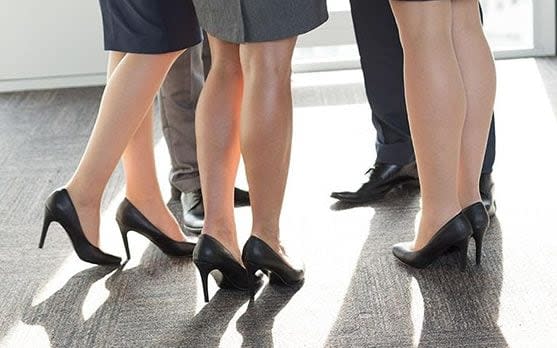Ministers pledge new guidance and prosecutions for sexist bosses who force women to wear inappropriate shoes and clothes
An MP has told how her daughter broke her foot after she was forced to wear high heels at work as ministers promised more guidance for companies on sexist workplace dress rules.
Ministers said the code will stop employers breaking anti-discrimination laws and promised more prosecutions to shame employers who require them to wear “sexualised clothing”.
Labour MP Gill Furniss said her daughter Emily, 27, was denied sick pay or compensation after suffering a metatarsal fracture, the same injury that threatened to put David Beckham out of the 2002 World Cup.
She hit out at employers who force women to have to put up with “humiliating and degrading” dress codes.
She said some women are told they must wear a “full face” of make-up and are “even told which shade of red” to wear on their lips.
Ms Furniss said: “We know that in some professions, standing in high heels for a period of an eight-hour shift is the norm.
“Wearing heels in this way often causes foot pain, bunions, skin lesions, lower limb pathology and other related discomforts for the heel-wearer.
“In fact, my own daughter suffered from a metatarsal fracture, which is more commonly affiliated with sports injuries, when she was forced to wear high heels in a former retail job.
“Quite literally adding insult to injury, she was denied any compensation or sick pay as she wasn't on the payroll for long enough.
“Needless to say, she did not return to this type of work, but not everyone has that choice.”
The debate, in Westminster Hall, came after more than 150,000 people signed an e-petition calling on ministers to outlaw discriminatory workplace dress codes.
London receptionist Nicola Thorp launched the petition after she was sent home from work when she refused to wear high heels.
The revelations prompted the Petitions Committee and Women and Equalities Committee to investigate sexist work dress codes. They called for a review of equality legislation after it emerged that women have been told to dye their hair and wear revealing clothes.
Labour MP Helen Jones, who chairs the Petitions Committee, said they heard evidence of “discriminatory” and “totally reprehensible” attitudes towards women.
She said: “It is fair to say that what we found shocked us. We found attitudes that belonged more, I was going to say in the 1950s but probably the 1850s might be more accurate, than in the 21st century.
“And we found that women, especially young women in vulnerable employment, were exploited at work.
“Threatened with dismissal if they complained, they were forced to bear pain all day, or to wear clothing that was totally unsuitable for the tasks that they were asked to perform, or to dress in a way that they felt sexualised their appearance and was demeaning. But they had to put up with this if they needed a job.”
Caroline Dinenage, the Womens and Equalities minister, said women had had to put up for too long with these requirements “because that’s the way things are”.
It was up to women what clothes and shoes they wore – not “outdated, dodgy, 1970s diktat”. She added: “Shod in heels or flats we are collectively putting our foot down.”
Ministers were drawing up guidance to force companies – especially in the hospitality and leisure sectors - not to force staff to wear inappropriate clothing.
The Government would also support the Equalities and Human Rights Commission in any legal actions to against companies which are forcing women to wear heels or inappropriate uniform, she said.



